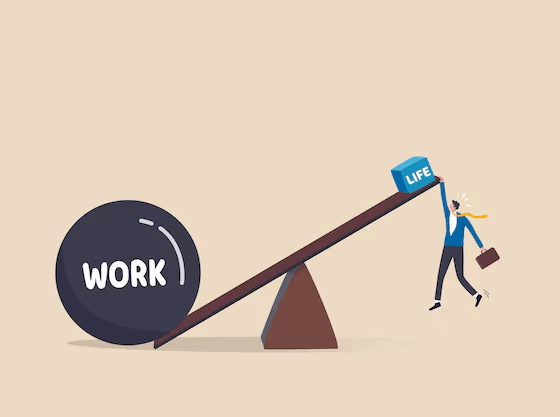Work-Life Balance Strategies That Work: Simple Tips for a Happier Life

In today’s fast-paced world, finding the right balance between work and personal life can feel like chasing a dream. Between meetings, deadlines, family, and social responsibilities, it’s easy to feel stretched too thin. But guess what? You’re not alone—and there are real strategies that can help you regain control.
Work-life balance isn’t about dividing your time equally between work and life. It’s about making time for the things that matter most, reducing stress, and living a healthier, more fulfilling life.
Let’s explore some real, effective work-life balance strategies that truly work—and how you can start using them today.
1. Set Clear Boundaries Between Work and Personal Life
This is one of the most important things you can do. Whether you work from home, in an office, or in a hybrid setup, it’s essential to set physical and mental boundaries between your work and personal time.
Try this:
- Log off on time: Once your work hours are done, shut down your laptop, turn off notifications, and stop checking emails.
- Create a workspace: If you work from home, set up a specific area as your office, so you can “leave work” at the end of the day.
- Communicate your boundaries: Let your coworkers or clients know when you’re available—and when you’re not.
2. Prioritize Tasks with a Daily Plan
Trying to do everything at once is a recipe for burnout. A better strategy? Focus on the most important things first.
How to do it:
- Start your day by making a short to-do list.
- Use the “Eisenhower Matrix” to sort tasks into 4 categories: urgent/important, not urgent/important, urgent/not important, and not urgent/not important.
- Tackle high-priority tasks first and give yourself breaks in between.
You’ll feel less overwhelmed and more in control of your day.
3. Learn to Say No (Without Feeling Guilty)
Saying “yes” to every request—especially when your plate is already full—will drain your energy and time. Saying no is not selfish; it’s self-care.
Start by identifying what truly matters to you. If something doesn’t align with your priorities or limits, it’s okay to say:
- “I’d love to help, but I’m at capacity right now.”
- “Thanks for thinking of me, but I can’t commit at this time.”
You’ll be surprised how freeing it feels.
4. Use Technology to Your Advantage
Yes, phones and laptops can be distractions—but they can also be your best tools for better balance.
Try these:
- Use scheduling tools like Google Calendar or Notion to block work and personal time.
- Set reminders to take breaks, drink water, or stretch.
- Use apps like Focus Booster, Pomodoro Timer, or Trello to keep your tasks on track.
The trick is to make technology work for you, not against you.
5. Take Real Breaks (And Actually Unplug)
It’s tempting to eat lunch at your desk or keep pushing through when you’re tired, but breaks help your brain reset. Without them, your productivity—and mood—can crash.
Make breaks meaningful:
- Take a walk.
- Stretch or do light exercises.
- Read a book or listen to calming music.
- Meditate or practice deep breathing.
Even a 10-minute pause can refresh your mind and give you a new perspective.
6. Make Time for What Fills You Up
Your personal life should not feel like a leftover after work. Whether it’s spending time with family, hobbies, reading, traveling, or simply doing nothing, those moments matter deeply.
What you can do:
- Schedule fun the same way you schedule work—literally add it to your calendar.
- Protect that time. Don’t cancel it unless it’s truly urgent.
- Be present. When you’re off work, really be off—no checking Slack, no peeking at emails.
A balanced life means your personal time is just as valuable as your professional time.
7. Delegate and Ask for Help
If you’re used to doing everything yourself, this might feel uncomfortable—but it’s crucial. Whether at work or at home, you don’t have to do it all.
Try this:
- At work: Ask teammates to collaborate or share responsibilities when possible.
- At home: Split household chores, order groceries online, or hire help if it’s within your means.
Delegating doesn’t mean you’re failing—it means you’re smart about protecting your energy.
8. Take Care of Your Body and Mind
Your health is the foundation of everything else. If you’re not sleeping well, eating right, or managing stress, it’s almost impossible to feel balanced.
Start with the basics:
- Sleep: Aim for 7–9 hours per night.
- Food: Eat nourishing meals, not just caffeine and snacks.
- Exercise: Move your body daily, even if it’s just a walk.
- Mental health: Journal, meditate, or talk to a therapist if needed.
When you feel strong and healthy, it’s much easier to manage life’s challenges.
9. Practice “Digital Detox” Regularly
Constant screen time can increase anxiety and mess with your sleep. Taking time away from devices helps clear your mind.
Try this:
- No screens during meals.
- One screen-free hour before bed.
- Designate one “no-phone” day every weekend.
Even short detox periods can help you reconnect with the real world—and yourself.
10. Reflect and Adjust Often
Work-life balance isn’t a one-time fix. It changes as your job, family, and life evolve.
Every few weeks, ask yourself:
- Am I feeling burnt out?
- Am I spending time on things that matter to me?
- What can I let go of or change?
Small adjustments can make a big difference. Don’t wait until you’re overwhelmed—course-correct regularly.
Final Thoughts
There’s no “perfect” formula for work-life balance, and it won’t look the same for everyone. The key is to find what works for you—based on your job, personality, values, and lifestyle.
By setting boundaries, prioritizing what matters, and making space for your health and joy, you can create a more balanced, fulfilling life.
It’s not easy—but it’s absolutely possible.
5 Frequently Asked Questions (FAQs)
1. What does work-life balance actually mean?
Work-life balance means having enough time and energy for both your job and your personal life. It doesn’t always mean equal time, but rather a healthy and satisfying balance that allows you to thrive in both areas.
2. Can I achieve work-life balance if I work long hours?
Yes, but it takes more effort. You’ll need to set strong boundaries, maximize your free time, take care of your health, and prioritize personal activities—even in small pockets of time.
3. Is work-life balance just about time management?
Not entirely. Time management is a big part, but energy management, mental health, and personal fulfillment also play key roles. You can have free time but still feel exhausted if you don’t rest or recharge properly.
4. How do I know if I’m out of balance?
Some signs include constant stress, lack of sleep, poor health, strained relationships, or feeling unfulfilled. If your work is consistently taking over your life, it’s time to reevaluate.
5. Can employers support work-life balance?
Absolutely. Employers can help by offering flexible hours, respecting personal time, encouraging breaks, and creating a supportive culture. If you’re struggling, don’t be afraid to talk to your manager about better support.







